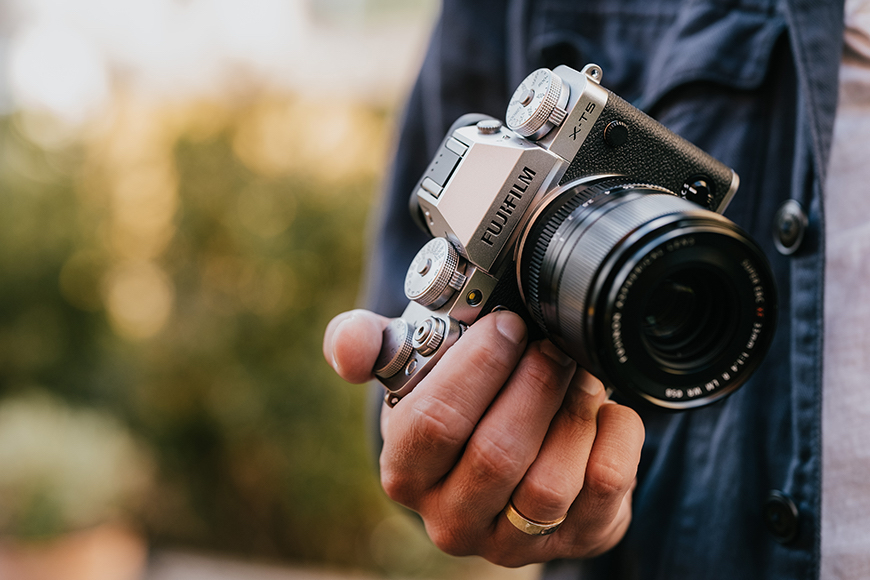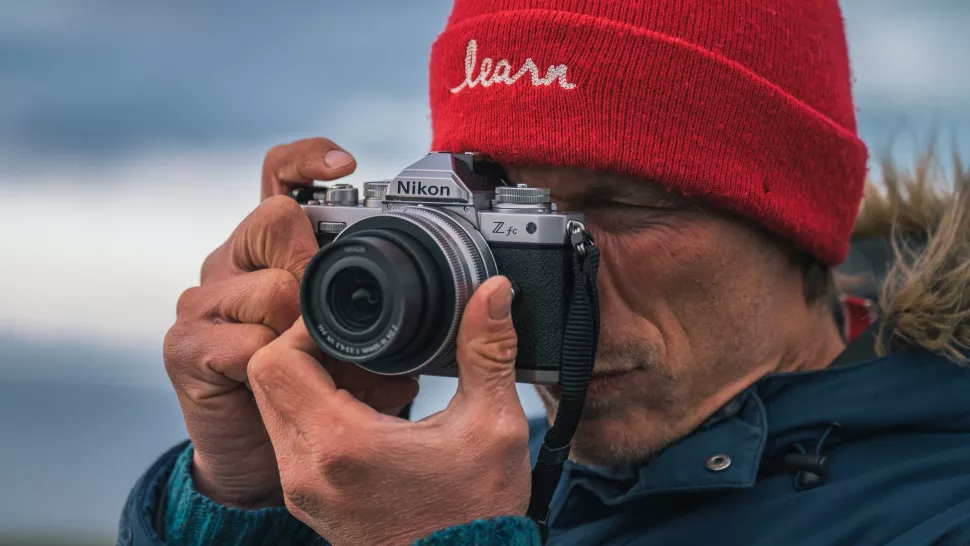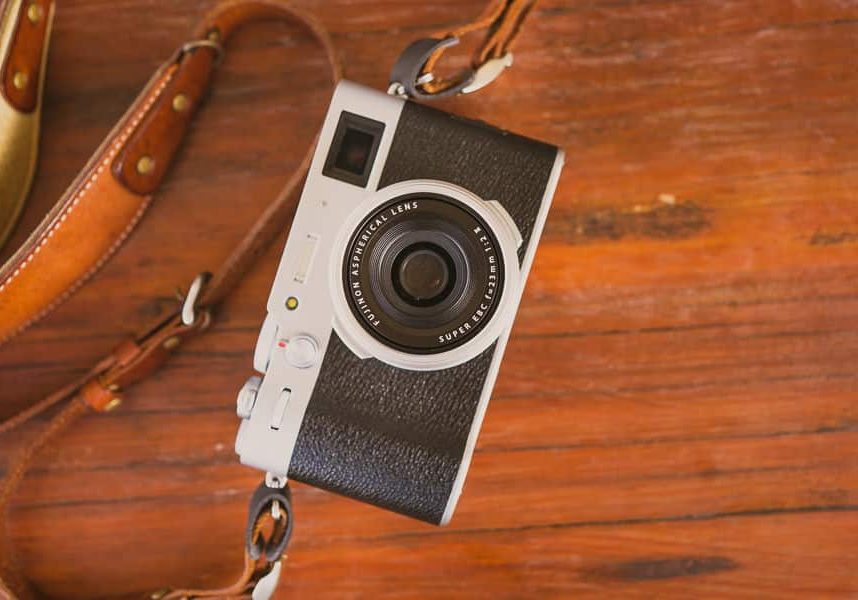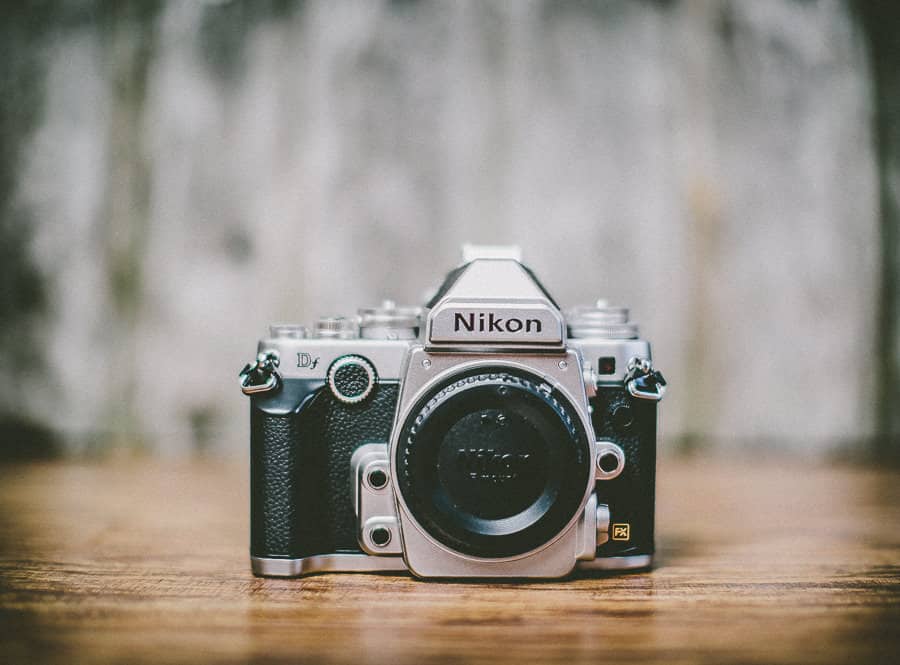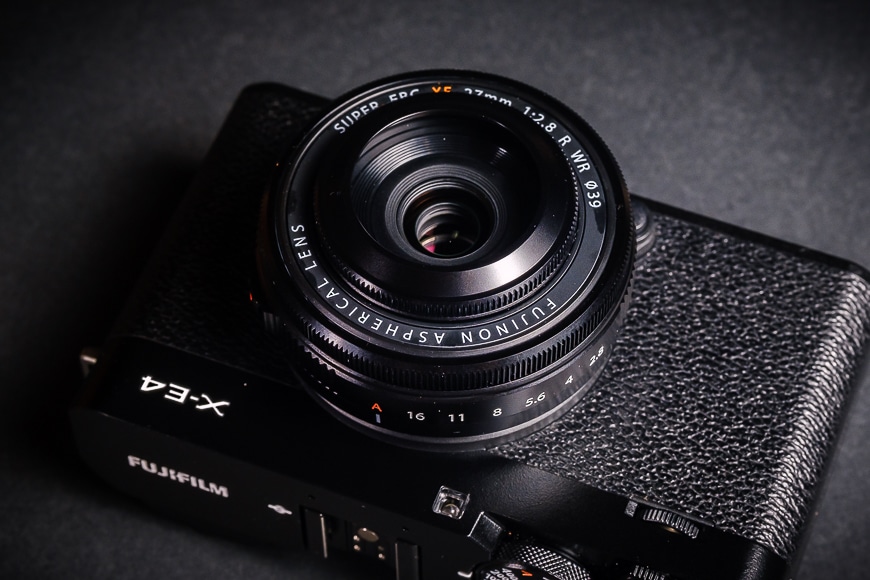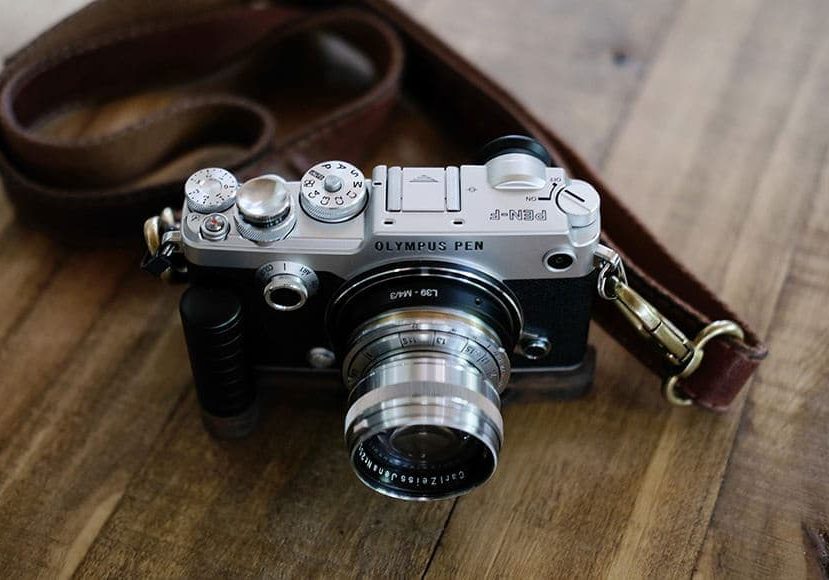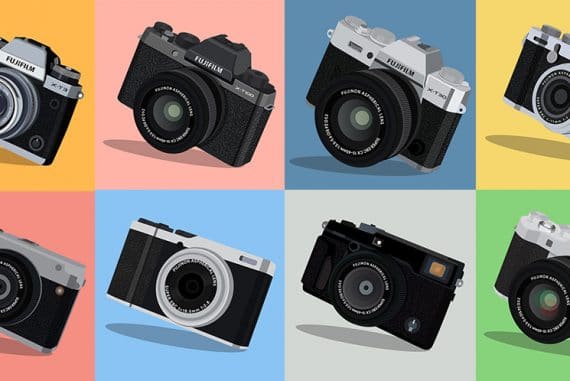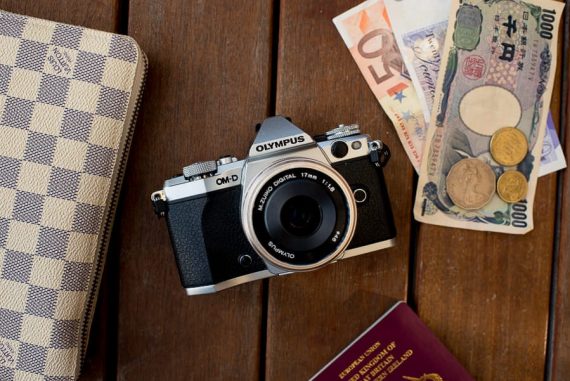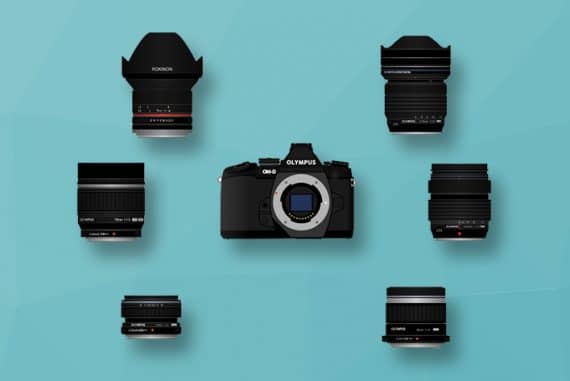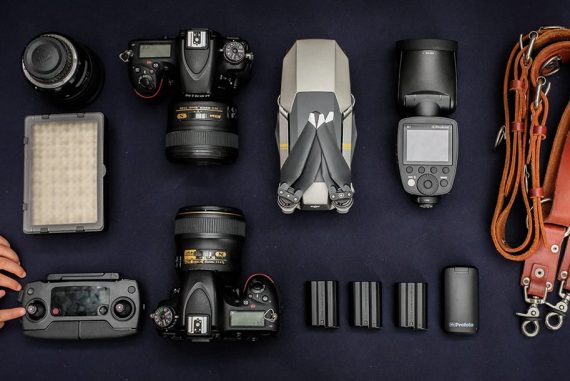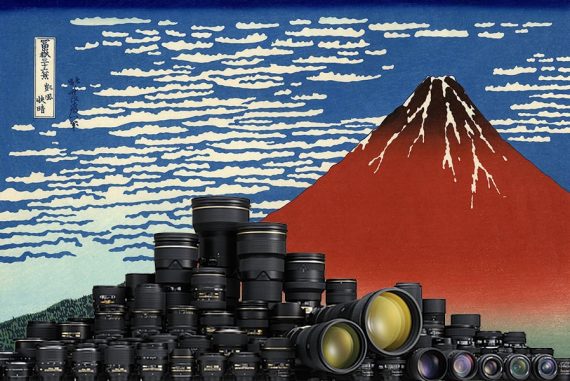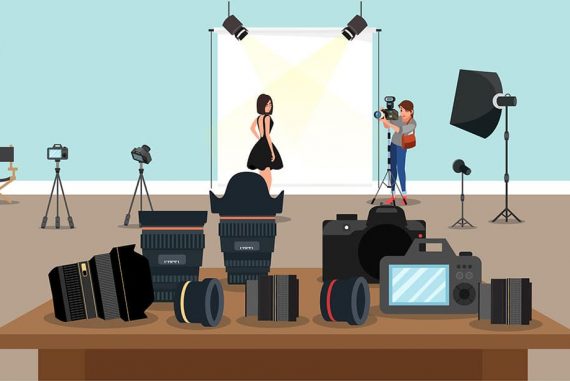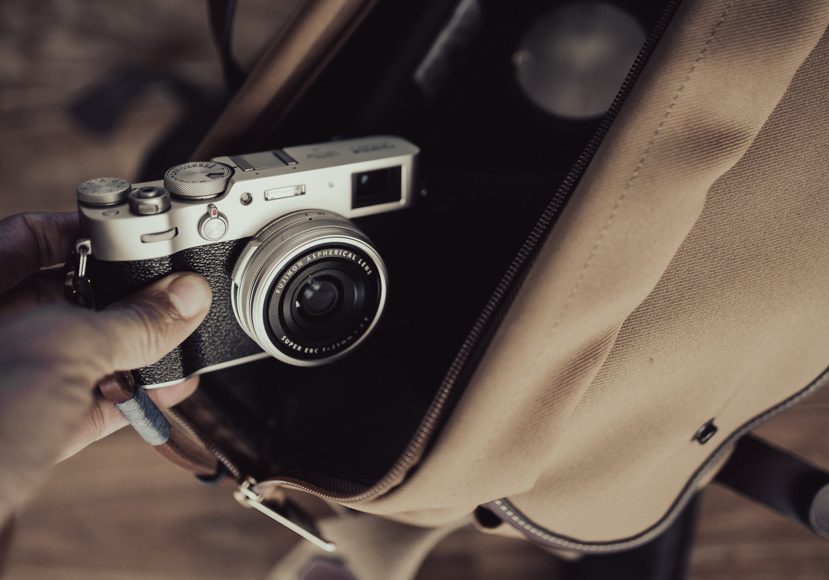
7 Best Retro-Style Digital Cameras of 2023
Using a retro-style digital camera offers the best of both worlds - the convenience of digital and the nostalgia of film. These are our favorite retro cameras.
This guide will take you through some of the best retro cameras on the market.
The past is back in fashion, and cameras are part of that.
It was always going to happen. Think of Hipstamatic, think of Instagram filters, think of VSCO presets, and vintage photography.
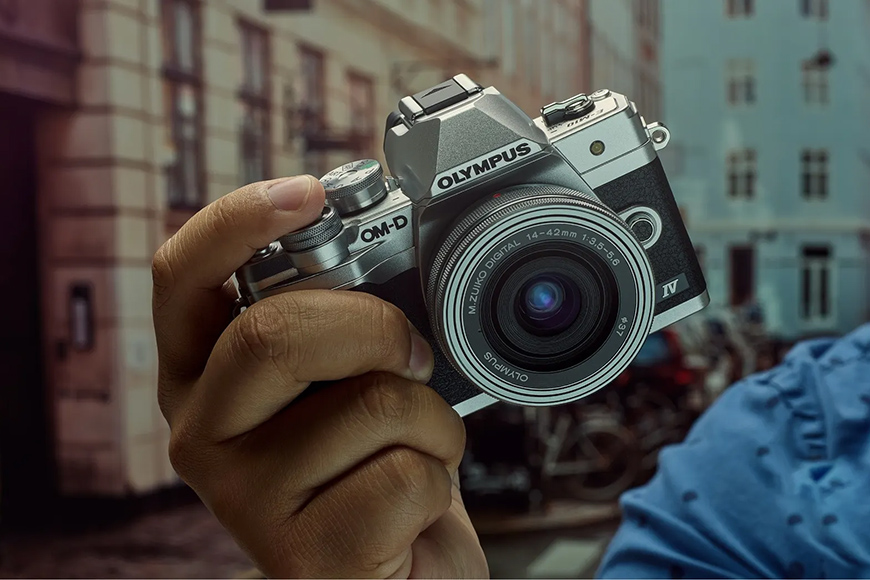
Gorgeous retro-inspired camera with great features and affordable lenses.
The hunger for film-style imagery has always been there, even amongst people who are too young to know what it is like to photograph with a point-and-shoot on 35mm film.
In recent years, camera manufacturers have picked up on the next level of this obsession and have given photographers options to have their images look retro and their digital cameras look like film cameras.
They’ve brought back compact, minimal, and stylish designs. They’ve brought back complete manual control as standard.
But with a twist. These rangefinder-esque bodies are digital cameras with beefy sensors, tilt screens, and customization options everywhere.
Is your interest piqued? Then, let’s dive in and discover the best retro cameras.
Table of Contents
What are the Best Retro Cameras in 2023?
| Image | Product | Features | |
|---|---|---|---|
 | Olympus OM-D E-M10 Mark IVOUR TOP PICK |
| Check AMAZON Price → Check B&H Price → |
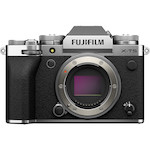 | Fujifilm X-T5BEST ALL-ROUNDER |
| Check AMAZON Price → Check B&H Price → |
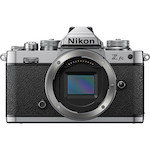 | Nikon Z fcBEST NIKON RETRO |
| Check AMAZON Price → Check B&H Price → |
 | Fujifilm X100VBEST COMPACT RETRO |
| Check AMAZON Price → Check B&H Price → |
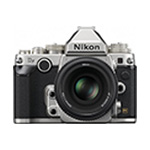 | Nikon DFBEST FULL FRAME RETRO |
| CHECK AMAZON PRICE → |
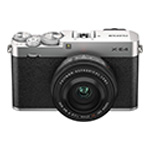 | Fujifilm X-E4 |
| CHECK AMAZON PRICE → |
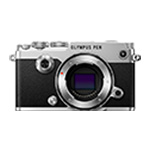 | Olympus PEN-F |
| CHECK AMAZON PRICE → |
1. Olympus OM-D E-M10 Mark IV (Our Top Pick)
- 20-megapixel sensor
- Good-looking
- Solid feel and handling
- Affordable
- A lot of plastic parts
- Main menu navigation can be complicated
The Olympus OM-D E-M10 Mark IV is our top pick due to its combination of a handsome retro design with plenty of versatile modern features.
Though it’s a small camera, with its sculpted grip and casing, it still feels big enough in the hands, with stable handling.
Its lens selection is smaller and more affordable than other APS-C cameras, as it’s micro four-thirds, among other reasons.
But, if you use an adaptor, you can also mount SLR and Leica lenses to beef up your options.
The Olympus OM-D E-M10 Mark IV has a wide range of automatic image settings that make it suitable for beginners, while still giving experienced shooters the complete manual control they’ll be looking for.
With a 20-megapixel sensor and wide ISO sensitivity range, it will help you get detail-rich, high-resolution stills in even low-light situations.
Add to that its ability to record 4K video and in-built 5-axis image stabilization, and the Olympus OM-D E-M10 Mark IV is an all-around marvel, especially at this price point.
A non-retro feature – the tiltable rear LCD screen – will also keep selfie lovers and vloggers happy.
2. Fujifilm X-T5 (Best All-Rounder)
- Great image quality
- Good autofocus capabilities
- Chic
- Huge sensor
- Subject-aware autofocus complicated to use
- Not suitable for beginners
The Fujifilm X-T5 is firmly aimed at the all-round shooter who knows their way around a camera and appreciates that retro look and feel.
And there’s no denying it’s a beautiful machine. With its manual dials for ISO, shutter speed, and aperture, it has the appearance of a high-quality camera from the last century.
It’s small but has a good weight and heft to it, and despite its diminutive size, it has plenty of features.
There’s that massive 40-megapixel sensor to start with, plus in-camera image stabilization, and the ability to record up to 6.2K video.
It also contains Fuji’s ground-breaking Pixel Shift Multishot technology. This quadruples the camera’s resolution, giving you 160-megapixel, detail-rich images.
And those images can be processed in a way to make them look like they’ve come from (or been inspired by) the past, too, making this a digital camera that produces film like photos.
Included in this system are 19 film simulation modes, which reproduce the aesthetic of some of the classic Fujifilm film stock (for example, Velvia, Astia and Provia).
3. Nikon Z fc (Best Nikon Retro)
- Great image quality
- Good price
- Tilt screen
- Kit lenses don’t come with aperture rings
- No in-built image stabilization
This classic-looking mirrorless camera in its magnesium alloy and plastic body, houses features that not only make it ideal for photography, but videography too.
Like the Fujifilm X-T5, its main focus is on giving the user the feeling of shooting with an old film camera.
As such, it has a comfortable, round viewfinder, and ergonomically well-positioned dials to control aperture, shutter speed and ISO across the top.
For less experienced shooters you also have modes you can switch to, for example, Aperture Mode, to let the camera take some control.

Nikon Z fc compared to a Nikon FE2 classic film camera | Jade Ferguson
As it’s the same system, you can use the body with Z-mount lenses. Although, unlike the full-frame Z range, there’s no in-body image stabilization in this camera, so you need to be careful which lenses you choose to use with it, especially if you’re shooting video.
And it’s meant for that.
The camera supports live streaming and has a 209-point subject-tracking autofocus and a tilt-screen.
It’s also set up to take an external microphone and other vlogging accessories.
But the best thing? You can look cool while you do it.
4. Fujifilm X100V (Best Compact Retro)
- Great autofocus capabilities
- Excellent image quality
- Great, sharp lens
- Tilt screen
- Hybrid viewfinder is not to everyone’s taste
- Poor ergonomics
A very popular choice amongst photographers in general, and specifically compact shooters, this compact mirrorless camera fits a lot of features into a small package.
Not only that, as a package it also looks great. Its design is clearly inspired by the old rangefinder camera bodies. It’s sleek, minimalist, and all the dials are nicely incorporated into the overall form factor.
One of its unique features is its hybrid optical viewfinder (OVF) and electrical viewfinder (EVF). You can switch between the two for completely different shooting experiences (not many compact cameras have viewfinders.)
The OVF gives you the retro feel of shooting directly through the viewfinder, and the EVF shows you a preview of what you’ll actually get, in the same way that standard mirrorless cameras do.
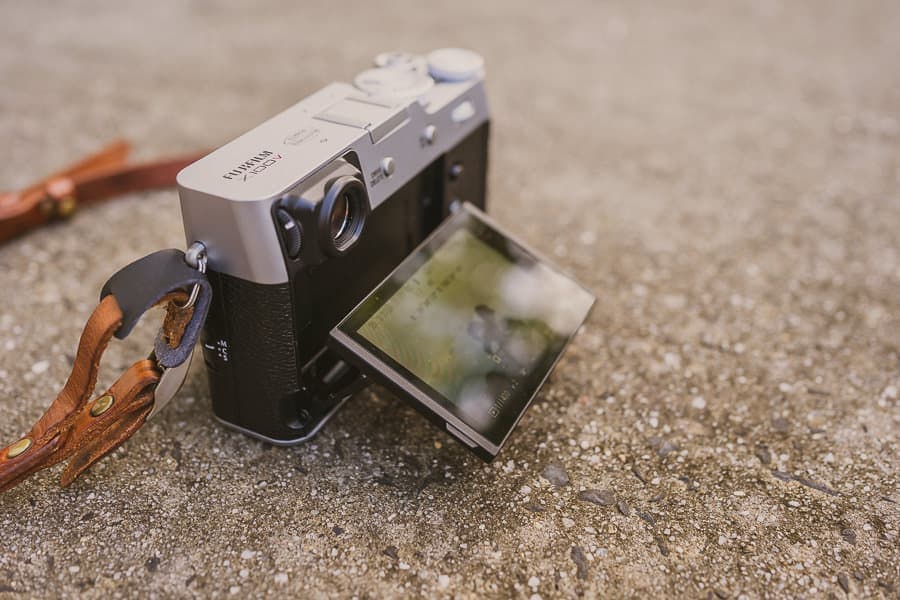
Even retro-style cameras can have useful modern camera features like tilting LCD screens!
Another highlight of this camera is the redesigned lens. At 23mm it’s equivalent to 35mm, which is a really comfortable point-of-view and focal length for a wide range of situations.
With an aperture of f/2 it’s also fast, great for low-light shooting and creating bokeh. It’s razor-sharp, too, with fantastic colours and contrast.
And combine this fantastic lens with one of the 17 classic film simulations incorporated into this camera, and you have images that have a retro look to them too.
5. Nikon DF (Best Full-Frame Retro)
- Lightweight
- Quite expensive
- Strong, solid build
- Difficult to find
- No video capabilities
Nikon DFs are a little tricky to find now, but you can still pick them up on the second-hand market.
And if you do manage to get one, you’re in for a retro treat.
It’s a solidly-built camera with relatively bulky but classic looks. And it’s classic in more ways than one. It’s a dedicated stills photography camera: no video here.
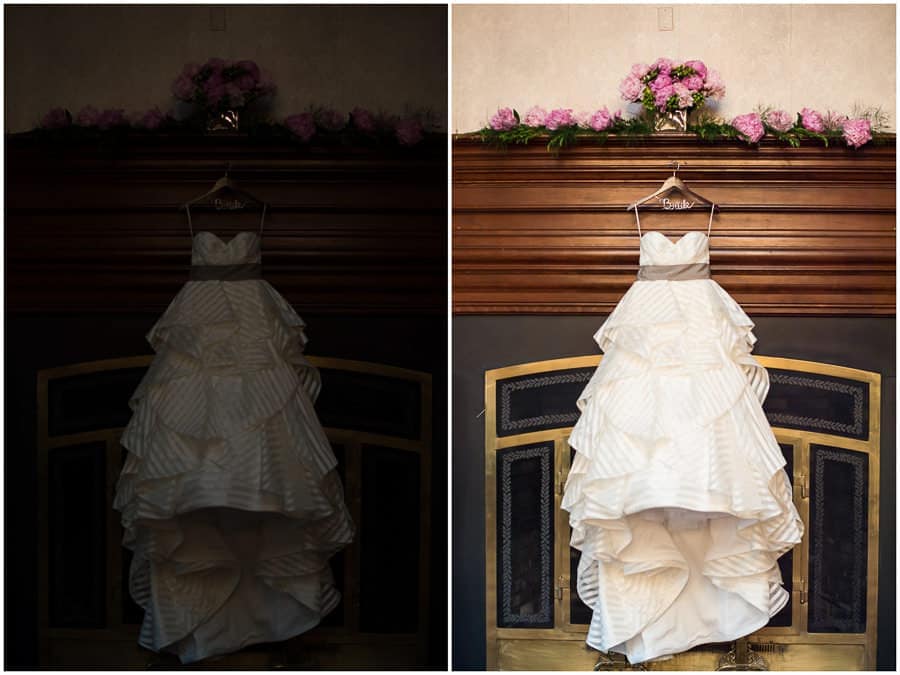
Even underexposed images can be ‘brought’ back, thanks to the Nikon DF’s full frame sensor | Jay Cassario
That might make some people angry, but personally, I love it. If you’re going to go retro, why not go full retro? After all, that’s how all cameras used to be.
It handles well, with tactile manual control dials for aperture, exposure compensation, ISO and shutter speed, and has lightning-fast autofocus.
At its digital heart is the Nikon D4 full frame sensor. This has a great dynamic range (see example image above) and produces clean images in low light settings even at very high ISO.
The files it gives you are bright and with the beautiful tones and colors that Nikon is famous for.
As a retro camera, it punches well above its weight in this list.
6. Fujifilm X-E4
- Pocket-sized
- Excellent autofocus
- Great sensor
- Sleek design
- Not weather-sealed
- Can feel a bit cramped in use
With its 26-megapixel APS-C sensor, the Fujifilm X-E4 is equipped with the same sensor as the rest of Fuji’s classic format cameras.
You can expect great sensitivity and image quality, and video quality too, as long as you pair this camera with a lens that has image stabilisation, as this body doesn’t have it built-in.
It’s slim, lightweight, compact, and has an extremely minimalist design.
This means, in this case, that Fuji has done away with many of the manual controls and buttons you might expect to find on a modern camera or indeed, a point-and-shoot film camera.
But, no matter. You’ll control most things using the large rear screen, which is easy to use, and also articulates and tilts for vlogging use.
The Fujifilm X-E4 is not only a retro camera on the outside, but it’s retro on the inside too.
It has 18 kinds of film simulation. These replicate the look and feel of some of the most iconic (and retro) film stocks, including some of Fujifilm’s own.
Retro style cameras are all the more fun if the images they produce already have vintage film-look presets applied, and that’s exactly what Fuji’s X-series cameras like this one do.
7. Olympus PEN-F
- Electronic viewfinder
- Tilt-able rear screen
- Extremely customizable
- Film-style filters
- Needs an accessory for a truly stable grip
- Relatively expensive
- Crowded with manual controls
Marketed as the reincarnation of the original Olympus PEN, a 35mm film camera released in 1963, the Olympus PEN-F is a very retro-looking machine.
It’s housed in a handsome all-metal silver casing, with leather-style accents. And that casing along the top of the camera is set with a range of dials.
One of those is for exposure compensation, and the other dials are completely customizable. Set them up any way you want to suit your photography style, and you’re set.
And, one of the dials is even specifically for more custom settings, four modes in total, so you can really drill down into setting up a personalised shooting experience.
It’s also the only Olympus PEN camera with an electronic viewfinder (EVF). This is a great addition, especially for photography purists.
Shooting constantly through a rear screen, unless you’re producing video, is tiresome, especially in bright sunlight. And you won’t be shooting much video with this camera.
Although it does a good job of that with its in-built 5-axis image stabilization, there’s no external mic input.
But it’s good for street photography (especially if you accessorize it with a grip). It can shoot at 10fps, so good for shooting in bursts to really capture those scenes.
Another retro-style feature is its built-in color profiles, accessed by another dial on the front of the camera. Choose from film-stock style filters to give your images a little something extra.
What Are Some Cool Accessories for a Retro-Style Digital Camera?
As you’re interested in retro cameras, I’m guessing you’re also appreciative of beautiful retro design in general!
Fortunately, there are a ton of great-looking accessories for retro cameras.
Personally, I have a vintage leather strap attached to my Fujifilm X100V at all times.
Here are some other things to consider:
- Camera Straps: Choose a vintage-inspired camera strap made of leather or colourful fabric to match the retro aesthetic and add comfort while carrying the camera.
- Lens Filters: Experiment with different lens filters, such as polarizing filters, neutral density filters, or color filters, to achieve unique effects and enhance the retro vibe of your photos.
- External Viewfinders: Attach an external viewfinder to the camera’s hot shoe for a more authentic and classic shooting experience, especially if the camera lacks a built-in viewfinder.
- Lens Hoods: Opt for a retro-style lens hood to reduce lens flare and enhance the vintage look of your camera.
- Camera Bags and Cases: Carry your retro-style camera in a stylish camera bag or case designed to protect the camera while adding a touch of vintage charm.
- Lens Adapters: Explore lens adapters that allow you to mount vintage lenses onto your digital camera, expanding your creative options and achieving unique, vintage-inspired image characteristics.
- Hand or Thumb Grip: Attach a hand grip to the camera body for better ergonomics and stability during shooting, enhancing both comfort and control. Leica shooters often use a thumb grip.
FAQs
What is a retro camera?
A retro camera, in this context, is a modern digital camera, with modern features, made to look and handle like a 35mm rangefinder-style film camera.
A retro digital camera is normally a compact mirrorless or DSLR camera with an optical-style electronic viewfinder (or hybrid), with manual controls for ISO, exposure compensation, aperture, and shutter speed.
But, as they’re modern digital cameras, most of them offer the user a raft of ways in which to either customize these controls and settings, tweak them, or both. Rangefinders definitely didn’t allow you to do that!
And, to replicate if not the exact feeling, but the result of shooting with film, many retro cameras offer filters to let you make your images look like they were taken on classic film stock.
The best retro cameras are the ones that best suit your needs.
For example, if you want something to shoot video or blogs, then you shouldn’t be buying the Nikon DF, but should probably look at the Nikon Z fc.
If you want a compact camera with a single lens and also would like to feel like you’re actually using a rangefinder, then consider the Fujifilm X100V or the Olympus PEN-F.
Shooters who want interchangeable lenses and more all-round capabilities should be looking at the Olympus OM-D E-M10 Mark IV, the Fuji X-T5, or the Nikon Z fc.
Do retro digital cameras take photos like a film camera?
Retro digital cameras combine the look and feel of a retro film camera with the technology of modern mirrorless or DSLR cameras.
Some retro digital cameras only replicate the manual control system of rangefinder cameras, with metal dials for aperture, exposure compensation, shutter speed, and ISO.
Some go a step further by also having optical viewfinders, which means that your view through the viewfinder is exactly that, what you see with your eye, rather than what’s seen by the lens.
And other cameras take this experience a step further by allowing your photos to look like they were taken on film stock.
What camera makes photos look retro?
Out of the seven cameras in this guide, four of them, the Fujifilm X-T5, the Fujifilm X100V, the Fujifilm X-E4, and the Olympus PEN-F, allow you to do this.
These four retro digital cameras have multiple film simulation modes that replicate the look and feel of traditional film stock.
What are the differences between SLR and DSLR cameras?

Gorgeous retro-inspired camera with great features and affordable lenses.





